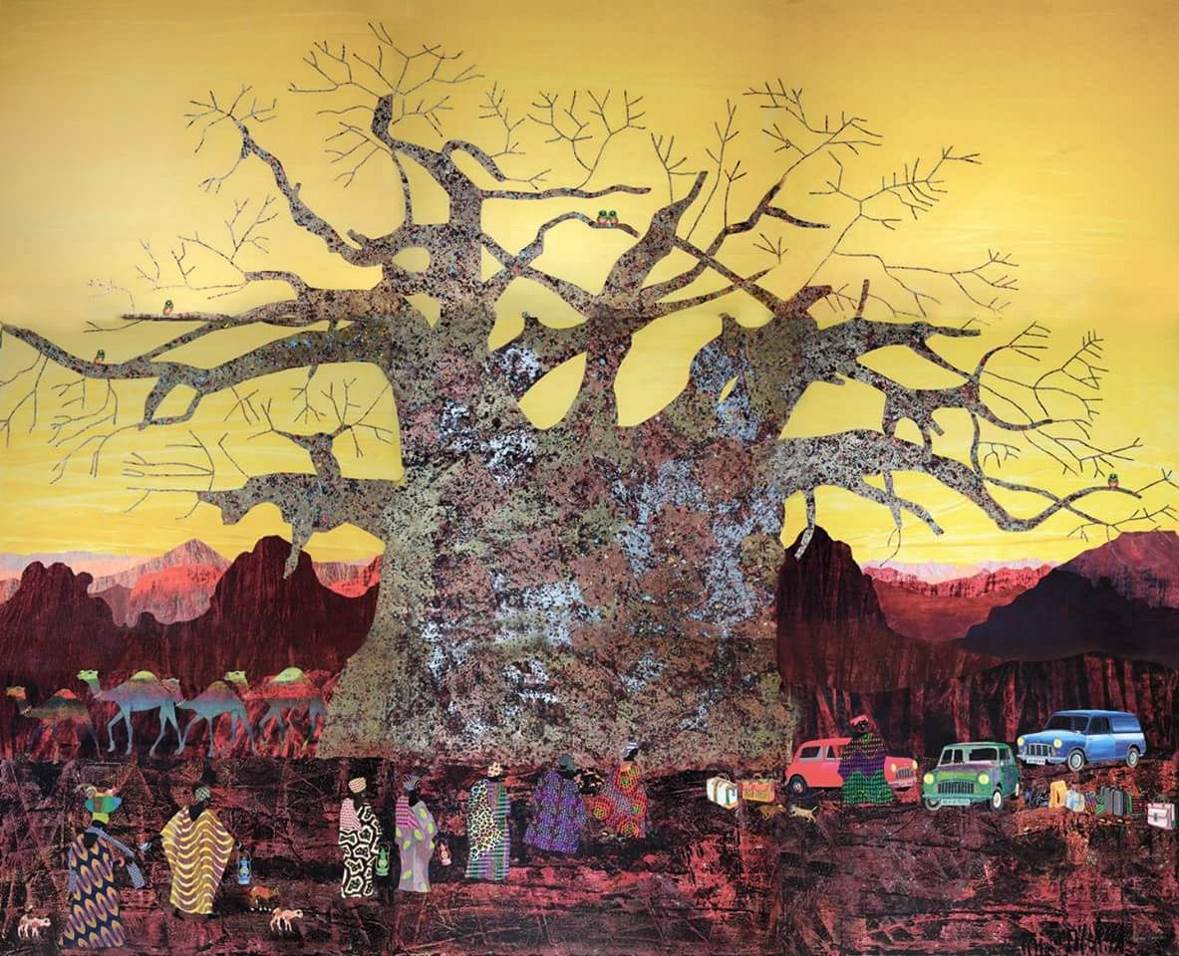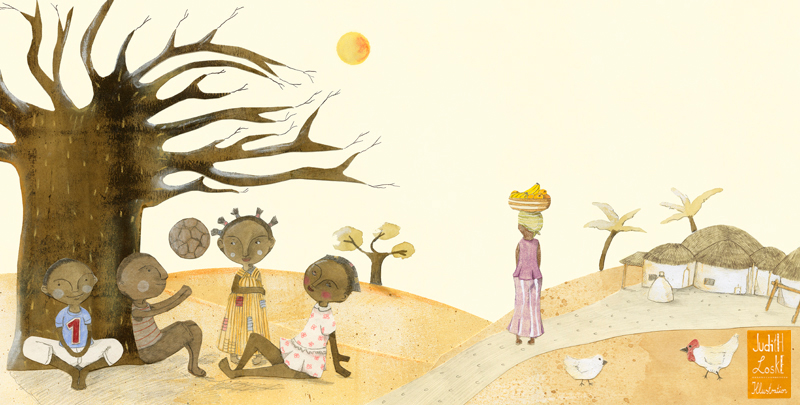umShimulu – Tree of life

The first section of the programme is based on the Igbo and Yorubu proverb “It takes a village to raise a child”. The proverb exists in many different African languages and reflects the emphasis African cultures place on family and community. This proverb is so widely used in Africa that there are equivalent statements in most African languages, including “One knee does not bring up a child” in Sukuma and “One hand does not nurse a child” in Swahili.
In many African communities, it is common for a child to be raised by its extended family, in many cases spending long periods of time living with grandparents, aunts and uncles. Even the wider community sometimes gets involved, as children are seen as a blessing from God upon the entire community. This also applies to villages formed around baobabs. The programme encourages us to be actively involved in our communities - to become part of our village. To quote from Bahá’u’lláh: “The world is but one country and mankind its citizens. We are all fruits of one tree and leaves of one branch.”
The second section of the programme buids on the first by challenging all of us to become trees of life ourselves under which other people may feel safe and nurtured to establish villages of their own. Just as people in rural villages work together to raise children, we need to form virtual villages with people that cross our paths, so that all of us may dance, sing and love.

It takes a village to raise a child
Traditional, arr. Philip Miller

2. Ubi caritas et amor
Ola Gjeilo (born in 1978)
Sung in Latin
This work portrays the sense of community that is the underlying theme of this programme.
Where charity and love are, God is there.
The love of Christhas gathered us together.
Let us rejoice and be glad in it.
Let us revere and love the living God.
And from a sincere heart let us love one another.
Amen.
Lyrics and music: Pieter Bezuidenhout
Sung in Zulu and English
This is the first song in a sub-section of the programme that depicts a day in the life in a village. There are three generations in the village: children, adults and elders. The adults and elders work together to create a safe space for the children, with the adults relying on the wisdom of the elders. Most importantly, thecommunity createsa place of hope so that, when dawn breaks, the children feel free to dance, sing and love.
Under African skies blue, where a small child sleeps in his innocence true
He sits by the flame of the fire, he plays by the beat of the drum;
The older and wiser says a new day will come
The distant rolling of thunder, the mighty gush of the wind
But the message they speak of is in the songs children sing
It’s a prayer that they whisperto the children at night before the first light!
And at dawn they will rise and at dawn they will dance
And at dawn they will sing and at dawn they will love!

4. Dwergieman
Arr. FR Smith
For female voices
Storytelling is inherent to African culture. It brings meaning to life and gives hope to future generations. This is a children’s song about a dwarf and his wife, thought to be mice when spotted by children.
Traditional
Arr. Michael Barrett and Ralf Schmitt
Sung in Xhosa
Religion forms an essential part of African culture. On Sundays, villagers often gather beneath trees for religious purposes.
The Lord has taken his son who lived amongst us
The son of the Lord God was crucified.
Father Jehovah.

Frank Havrøy (born in 1969)
The history of life on earth has been a history of interaction between living things and their surroundings. In many cultures, religion and everyday life are not divided and there is no border between the spiritual and the material. This native American prayer resonates with African spirituality. As in Ekuseni, the wisdom of the elders is emphasised.
My brother the star, my mother the earth
My father the sun, my sister the moon
To my life give beauty, to my body give strength
To my corn give goodness, to my house give peace
To my spirit give truth, to my elders give wisdom
For choir and tuned water bottles
The single most important reason why our planet bubbles with life, is water. All plants and animals need water to survive and reproduce. Water plays a key role in the earth’s ecosystem, where all living things interact and collaborate in order to maintain a delicate balance from which everyone benefits. Water unites us – plants, animals and human beings. We become one great organism connected by the ocean waves, the clouds in the sky, the arctic ice and the pouring rain.
Water is essential to human life, just like the air we breathe. However, this source of life is not shared equally. South Africa is a water-scarce countryand portions of the country have been suffering the worst drought in a century. In March 2018, the South African government declared the drought a national disaster.
San bushmen used to rely on baobab trees as a valuable source of water when the rains failed and the rivers dried. A single tree can hold up to 4 500 liters of water.
When communities share water, they share life.
In the mind of a melting snowman, in the sound from a whistling kettle,
In the gentle alighting crystal of ice, in the dewdrops of a colourful petal
To live, everyone must have water, to give, not to deny each other,
To bring from source to mouth just like the food of love from a nursing mother.
Sweet as an angel’s kiss. Salt as her falling tears,
Droplets in patience wearing away the mountains of time for billions of years.
In the shape of a cloud evolving, in the gleam when your skin perspires,
In the curse of a lost and foundering ship, in the silent face Narcissus admires.
To kill for in a global battle, to chill well in a plastic bottle,
To find between air and earth, both cold and wet, says Aristotle.
Mild as a mermaid’s song, wild when the oceans roar,
Never been born and never been buried, infinite waves caressing the shore.

Sung in Swedish
This song depicts the diverse things that happen during a day in a village or town. It concludes that life under the sun is quite eventful.It emphasises the importance of taking care of friends and working for the team.
The morning has woken up, Mother Sun has lit her light.
Someone washes sheets, someone else builds a house.
And you hear the knocking of a hammer, something old has become rusty.
And in the harbour someone throws an anchor.
It’s time for a little break.Take one day at a time!
Eat more potatoes, work more for the team. The earth is round!
Wash your hands, life is free! Now lie down and rest for a while.
Take good care of your friends, you are forgiven, show your feelings, dig where you stand.
Stand up for what you say, sit down in the boat. The apples will be fine this year!
Someone is feeling low, someone is tired of everyone talking,
Someone has to struggle to find some food,
Someone practises scales on a violin,
Someone eats a cherry.
And one thinks: there happens a lot in life under the sun!

Pärt Uusberg (born in 1986)
Text: Kristjan Üksküla
Sung in Estonian
Finally, night falls. As in Ekuseni, a baby is dreaming, lulled to sleep by a lullaby sung by its mother. The father is tired after a hard day’s work. But, the child knows that, in the eyes of its loved ones, it will always find the path home, even over the bridges of death. Therefore,morning dawnsas a bright new day in which to dance, sing and love.
Night falls and breathes into a boat,
Surrounded by a sea of silk, a little baby has, since birth,
Been dreaming solemnly.
The mother by the cradle has fallen asleep singing,
Aging in time, she cannot be interrupted.
The father stands by the well, his hands weary from exhaustion,
Only his thoughts in such a way travel, that no time is left for thought.
I remember the spring, the beginning, and the sultry rainfall of summer,
Which arrived like an old friend, through the silent history.
Hours pass and there is light, the bright morning waves her hand,
And look, distant childhood drifts away across the sky!
There, in the eyes of the one I love, is the eternal path home.
Over life, over time,over the bridges of death.

Be a tree for others
The second section of the programme builds on the first by challenging all of us to become trees of life under which other people may feel safe and nurtured to establish villages of their own in they can dance, sing and love.
Text: Sara Teasdale
Ēriks Ešenvalds (born in 1977)
To become a tree that protects others, we first need to let go of our preconceptions.
One by one, like leaves from a tree, all my faiths have forsaken me;
But the stars above my head burn in white and delicate red;
And beneath my feet the earth brings the grass to birth.
I who was content to be but a silken-singing tree,
But a rustle of delight in the wistful heart of night
I have lost the leaves that knew touch of rain and weight of dew
Blinded by a leafy crown I looked neither up nor down
But the little leaves that die have left me room to see the sky
Now for the first time I know stars above and earth below

Text: Bongekile Joyce Mbanjwa
English translation: Siphiwe ka Ngwenya
Afrikaans free translation: Franco Prinsloo
Commissioned work for Palissander’s 2018 programme
Sung in Zulu, English and Afrikaans
This work was commissioned for this programme. It uses a metaphor of a dry tree for a person who has been experiencing difficulties in life. However, a second person decides to assist over an extended period of time. Thisassistance is depicted through a rainstorm effectin the music. Eventually, green branches emerge and no-one can believe that the dry tree has become beautiful. The work captures the core of the theme of extending love to one another and enabling others to become trees of life in their own right.
It is unbelievable, it has never been seen, it is unheard of
The tree is dry, the tree is standing
People are looking at it, they look and shy away
No one wants to waste time, it is because it possesses no beauty, it has no shadow
I have looked, I have thought, I searched deep and lend a hand
I lend a hand continuously - days went by, months went by
There arrived summer, there emerged branches
I looked again but could not believe my eyes
They looked again but could not believe their eyes
We only believed when we saw green branches
Branches and leaves tell a story
Die takke en die blare vertel ‘n verhaal wat ons albei herken
We took off disappointmentand wore a smile
Our smile married love, love accompanied by tears
Tears of joy that flow like a river - trane soos riviere

For male voices
When we become a tree for others, our arms can shelter them from a storm, like branches of a tree would do.
Come listen in the silence of the moment before rain comes down.
There’s a deep sigh in the quiet of the forest and the tall tree’s crown.
Now hold me. Will you take the time to hold me and embrace the chill?
Or miss me. Will you take the time to miss me when the earth stands still?
‘Cause there’s no use running ‘cause the storm’s still coming
And you’ve been running for so many years.
Come listen in the silence of the moment before shadows fall.
Feel the tremor of your heartbeat matching heartbeat as we both dissolve.
Now hold me. Will you take the time to hold me and embrace the chill?
Or miss me. Will you take the time to miss me when the earth stands still?
‘Cause there’s no use running ‘cause the storm’s still coming
And you’ve been running for so many years.
So stay with me, held in my arms.
Like branches of a tree, they’ll shelter you for many years. Stay with me.

13. Hine ma tov
Traditional
Arr. Dirkie de Villiers (1921-1993)
Sung in Hebrew
Soloist: Thinus Pretorius
This work circles back to the second work in the programme, Ubi caritas, that stated that we need to love one another from a sincere heart. The lyrics are the first verse of Psalm 133. The Hebrew word “Yachad” is from the word “Yachid”, which means absolute unity and has a higher connotation than just peace and harmony.
Behold, how good and how pleasant it is for people to dwell together in unity!
14. Connected
Brian Tate
The programme concludes with the statement that we are all one body: “The world is but one country and mankind its citizens. We are all fruits of one tree and fruits of one branch.”
I am you are me.That’s what I said
I am you are me. Don’t you see?
It seems like I’m over here, and you’re over there
But there’s something between us that’s greater than air
See through the confusion, it’s not hard to do
It’s just an illusion this me and you
I am a part of you, you are a part of me
And so together we are one body.
I am inside your head, you are inside my heart
We fit together, perfect from the start!

